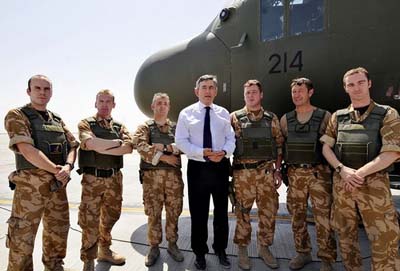The Pashtuns, who form the largest single ethnic cluster in Afghanistan, with extensive cross-border ties with Pakistan, and to whom the Taliban as well as President Hamid Karzai and many of his key ministers and administrators belong, have displayed a special distaste for the British in history. They have taken great pride in the claim that their ancestors bravely and gallantly foiled the British efforts in subjugating Afghanistan during their colonial rule of the Indian Sub-Continent. As enforced by successive Afghan political leaders, the Afghan population in general, and its Pashtun component in particular, hold a strong view of the British as cheaters, vacillators and conspirators, prepared to engage in any intrigues in order to promote their interests. Pashtun literature and folklore are full of stories painting the British as untrustworthy and adversarial to Islam, but glorifying the Afghan (primarily Pashtun) defeat of the British in the three famous Anglo-Afghan Wars in 1842, 1880 and 1919.
Exploiting this, the Taliban have been quite successful in impressing upon many of their compatriots that their ancestors had driven out the British in humiliation several times and that they must not now betray them by allowing the British to seek to reoccupy their homeland. As such, it is their religious and moral duty to join the fight against the British. Reportedly, many young Pashtuns, who form the bulk of the new generation of the Taliban, have heeded the call in increasing numbers. This is an ominous development for not only the British and their allies in the south, but also for the Hamid Karzai government, which the Taliban have dismissed as a stooge of the US.
It is not surprising that despite its dependence on foreign forces for its survival, the Karzai government’s relations with London have increasingly been quite recriminatory. On several occasions President Karzai has lashed out at the British for playing double games by publicly supporting his government on the one hand, and seeking to make secrete deals with various opposition groups, including the Taliban, on the other. In late 2007, when the report of the UN Office on Drugs and Crime (UNODC) listed Helmand Province as the largest producer of opium, Karzai asked the Head of the UNODC, Antonio Maria Costa, why the very province which was under the control of the British also produced the largest amount of opium in the country. There is a strong view within the Karzai administration that the British have pursued an approach of their own in the south; they have acted in line with the Afghan proverb that ‘they bang on the nail and the horse shoe at the same time’.
There is no question that the future of not only the British controlled Helmand, but Afghanistan as a whole, hang in the balance. Neither Britain nor, for that matter, the US and its other allies has so far come up with a strategy to put Afghanistan on a solid path of viable transformation. The Afghans’ – or more specifically the Pashtuns’ – distrust of the British has enormously helped the Taliban to draw on historical parallels to gain wider popular support for their cause.
It would have been far more appropriate if the forces of NATO countries other than Britain were deployed in the heartland of the Taliban. This is something to which NATO strategists need to pay serious attention. Otherwise, the British deployment against the Taliban within a Pashtun zone may well seriously undermine President Obama’s revised strategy in Afghanistan, which is now adopted by NATO, and thwart its goal of reducing the Taliban insurgency to a manageable level in the foreseeable future.
This article originally appeared here in the South Asia Masala.

